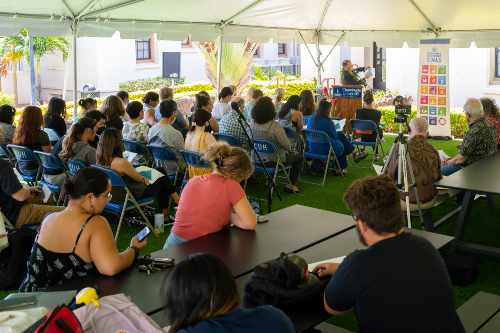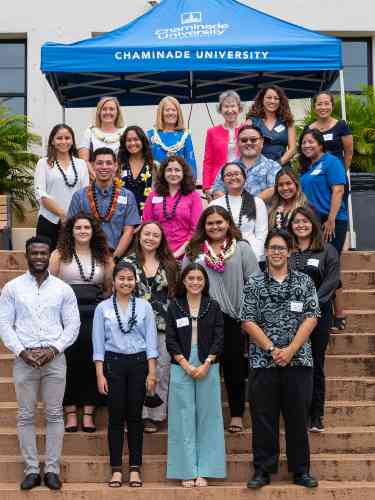Value your ‘ohana, embrace your kuleana and remember that obstacles are meant to be overcome.

That was the message East-West Center President Suzanne Puanani Vares-Lum had for Chaminade University’s Spring 2022 graduates at the university’s 64th annual Commencement exercises on May 7.
“When you walk out of here today, remember those who walked with you, remember all those who helped you get here, and remember what it means to be a servant leader—even when it’s tough,” said Vares-Lum, in her address graduates at the Waikiki Shell. “Be a light wherever you go, learn, listen, teach, encourage. … Embrace where you come from and don’t let others define who you are.”
Vares-Lum is the first woman and Native Hawaiian to be selected to lead the East-West Center. In speaking to graduates, she described her humble beginnings and her struggles at home and at school.
“Most people who knew me then would never have imagined that I would one day be standing before you—as your commencement speaker, a retired two-star general and now the head of one of our region’s most respected institutions of learning, the East-West Center,” Vares-Lum said.
“Fortunately, I spent many of my summers growing up with my grandparents on Maui. They knew everything about hard work and commitment. I watched and learned. We have so much to learn from our kupuna. It kindled a drive inside of me that said, ‘I refuse to be defined by life’s circumstances.’”

The message was well-received by graduates, who were faced with a host of new COVID-related challenges and were able to tackle them all to achieve their goals. The Commencement included about 540 students in all, including 140 undergraduates who qualified for Honors recognition.
Melanie Kushi was graduating with her Doctor of Psychology in Clinical Psychology (PsyD) degree, and said the graduation represented the end of a “long journey” and the beginning of a new adventure. She has been selected for a post-doctoral position at Waianae Coast Comprehensive Health Center.
“I couldn’t have done this without the love and support of my family,” she said. “It’s a lot of hard work.”
Fellow PsyD graduate Daniel Kinikini couldn’t agree more and added he’s thankful to his professors at Chaminade and his fellow cohort members for helping him get through the toughest days. “I’m looking forward to the future,” said Kinikini, adding that the pandemic has underscored the importance of a robust mental healthcare system in Hawaii. “Being able to work with, especially the underserved population, that’s something I’m really passionate about. Many doors are opened now.”
Educator Brandy Wilson was ecstatic after graduating with her Master of Arts in Teaching degree, and said she’s planning to bring her new skills to her current work. “I love preschool,” said Wilson, who teaches at Mokapu Elementary in Kailua. “Being at Chaminade has helped me so much to learn strategies for working with both general education and special education students. I will continue to do that.”

The Commencement ceremony began with a special invocation from Bro. Edward Brink, vice president for Mission and Rector at Chaminade. President Dr. Lynn Babington then addressed graduates, congratulating them on all they have accomplished—including in the face of adversity.
“During the past two years, we have all lived with uncertainty. You had to pivot to online learning, missed seeing some of your friends, faculty and staff, and were never able to properly celebrate all of your accomplishments in the community,” Babington said, in her speech. “You have learned the power of sacrifice because you have made necessary ones to keep yourself and your families safe.”
She added that Class of 2022 has demonstrated not only resiliency, but tenacity and grace in responding to an ever-changing landscape of obstacles. “You give us all great hope for the future,” she said. “You are our future leaders and we are confident in your ability to succeed.”
In addition to graduates, two extraordinary members of the community were honored at the Commencement ceremony: Kitty Sullivan Wo and Vaughn Vasconcellos were this year’s recipients of Chaminade’s Doctor of Humane Letters honorary degree.

Sullivan Wo, director of the Sullivan Family of Companies, is a philanthropist and previously served on Chaminade’s Boards of Governors and as chair of the Board of Regents. In her support of Chaminade’s mission, Sullivan Wo was instrumental in a major fundraising campaign and dedicated the Sullivan Family Library. Vasconcellos, who founded Akimeka LLC, has worked throughout this career to bolster opportunities for young people. He also previously served as chair for Chaminade’s Board of Regents and currently serves on Chaminade’s Board of Governors and Hogan Entrepreneurial Program Advisory Board.
The undergraduate Commencement speaker was Albert Respicio, who majored in Communication. In celebrating his fellow graduates, he asked them to remember all those who made the day possible. “We didn’t do this alone,” he said. “Thank you to all our parents, friends, teachers and everyone else in between that believed in us when we didn’t. When we struggled to think that we could.”

Graduate speaker Kiana Dizon, who received her Master of Science in Counseling Psychology degree, encouraged her fellow Silverswords to make big dreams and then go for them—just like she did. “I never thought I could make my dreams a reality until I pursued a passion at an institution that empowered me to do so,” she said, adding degrees speak not only to a person’s intellect but to their character.
Nursing graduate Lara Domogma said she feels the same way.
She called the day “surreal” and said she was moved to be able to share it with her family.
“This is really happening,” she said, beaming. “I’m here. I can’t believe it.”
While the Commencement ceremony was the main event of the weekend, the celebrations for graduates actually started on May 6 with a special Baccalaureate Mass at the Mystical Rose Oratory. The gathering, an annual tradition, is an opportunity for the Chaminade community to reflect on the accomplishments of the term’s graduating class and give thanksgiving for all they have.

Kaimaile Leopoldo, a Master’s in Teaching graduate, said she’s most grateful for the positive impact she’ll have on young people’s lives. Leopoldo said she went into preschool teaching because she loves working with very young children and serving as one of their very first teachers. “This degree means so much,” she said. “Having students take what I teach into their lives, that’s what I’m excited about.”
Joseph Durocher was at Commencement to celebrate the completion of his bachelor’s degree in Biochemistry. But he won’t be away from Chaminade for long: He’s hoping to apply to the university’s One Year MBA program and is interested in pursuing a future in biotechnology.
For now, though, he’s letting his newest title—college graduate—sink in.
“Being here right now,” he said, “it definitely feels amazing.”
Watch the Commencement recap here.
Watch the full Commencement here.






















